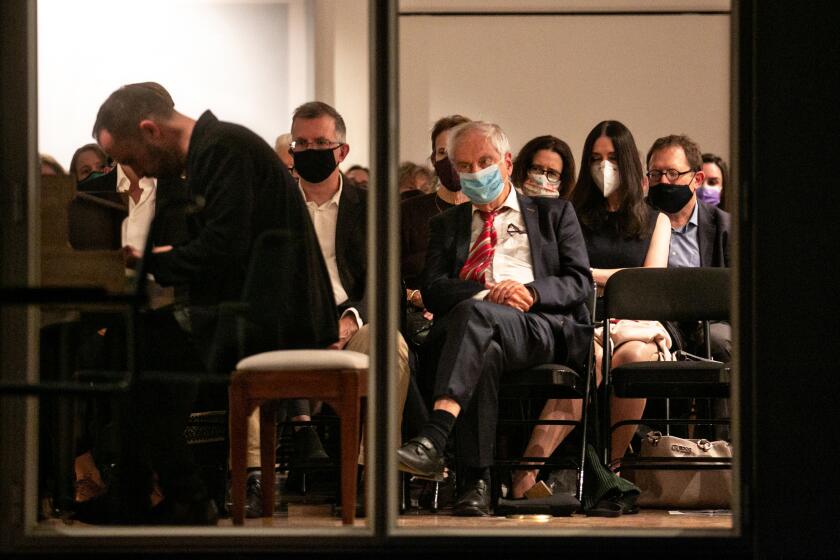The 7 best crime novels of the winter
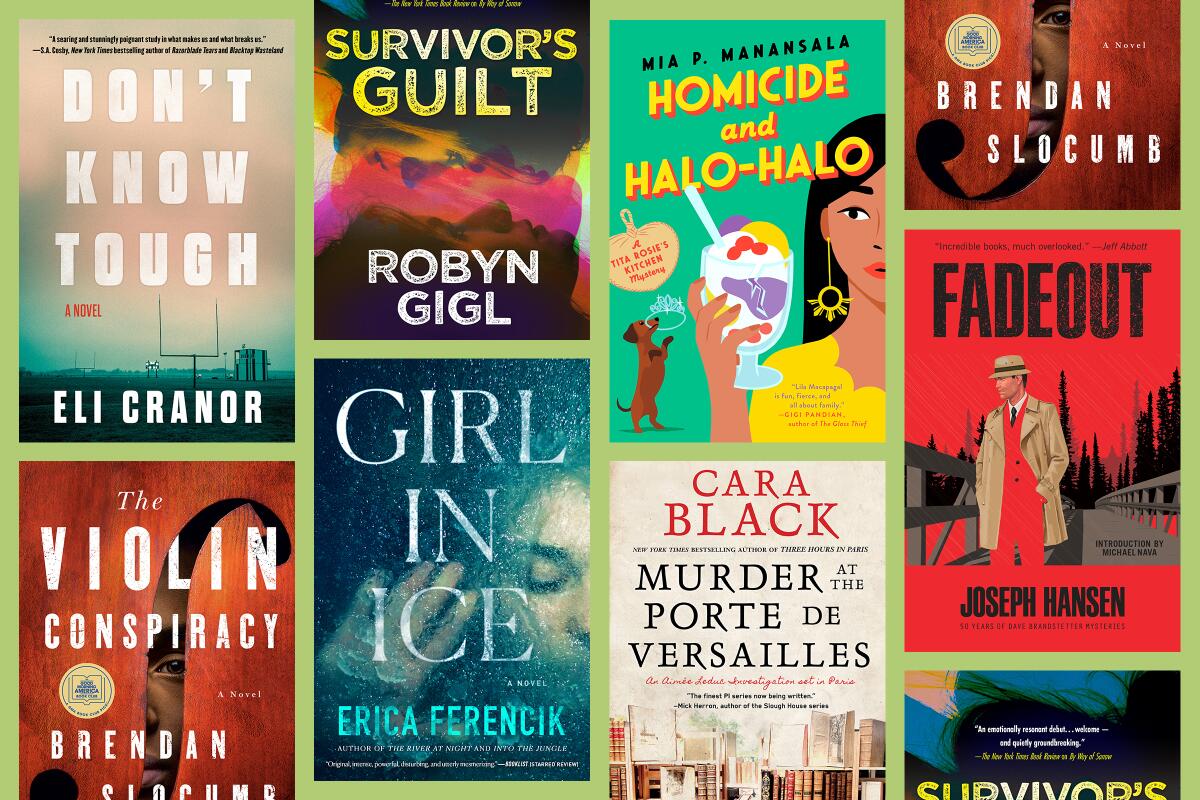
- Share via
On the Shelf
Best Crime Novels of the Winter
If you buy books linked on our site, The Times may earn a commission from Bookshop.org, whose fees support independent bookstores.
With spring tantalizingly close at hand, it’s time to take stock of this winter’s bounty of thrillers — from installments of beloved series to eye-opening debuts. Here are the most notable crime reads through the end of the season.
GREAT STAND-ALONES
The Violin Conspiracy
By Brendan Slocumb
Anchor: 352 pages, $28
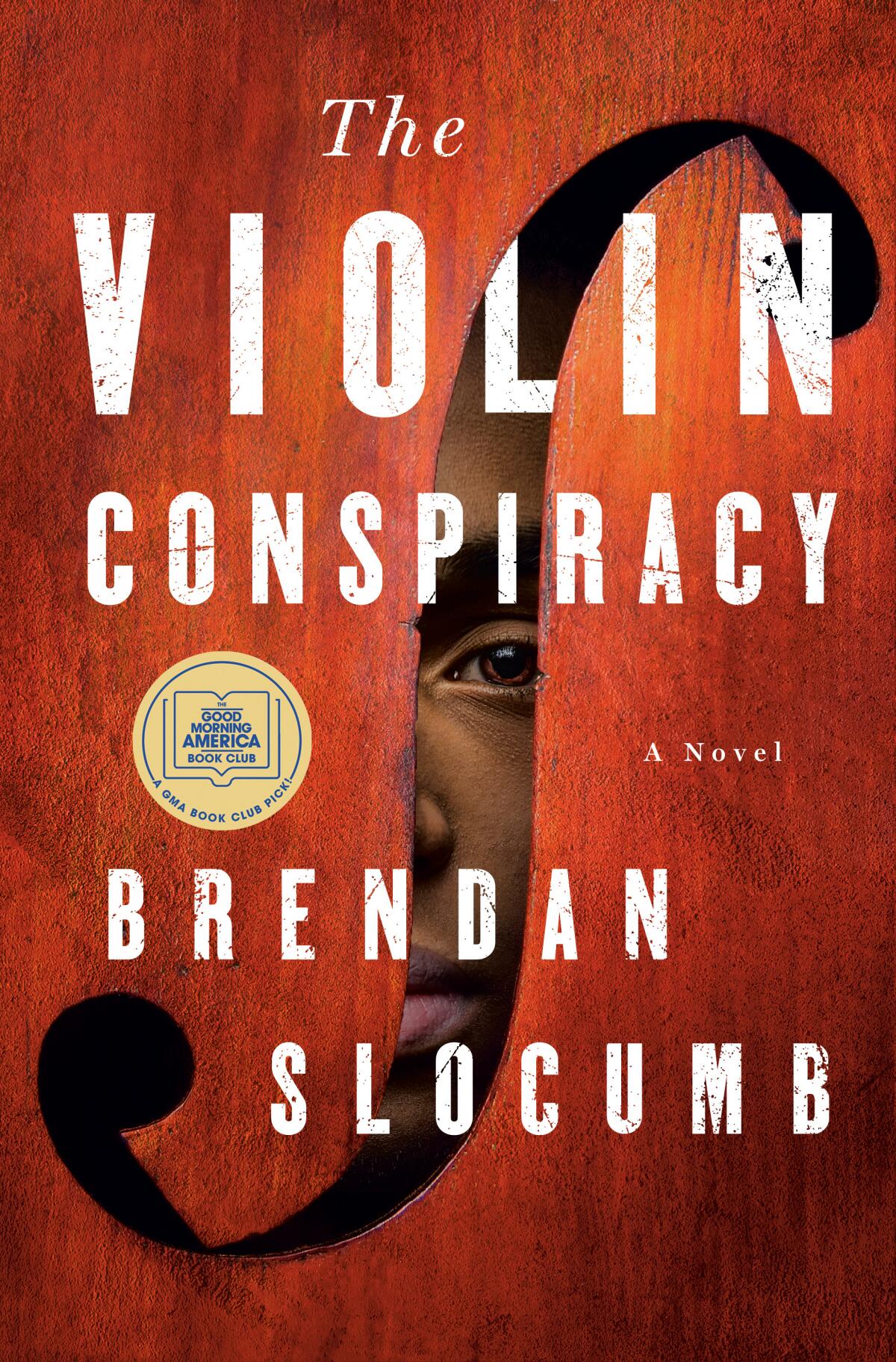
Slocumb, trained in violin and viola, is among the small number — less than 2% — of classical musicians who are Black. He draws on more than 25 years of performing and teaching for a debut thriller that toggles deftly between two storylines. In the first, North Carolinian Rayquan “Ray” McMillian suffers a tragic setback as he’s preparing for a Tchaikovsky competition — the most important of his career. The second, equally captivating, covers teenage Ray’s struggle to become a classical violinist in the face of racist slights and slurs.
The MacGuffin that unites the thriller with the bildungsroman is a fiddle once played by PopPop, Ray’s enslaved great-great-grandfather, probably the son of the master of the Marks plantation. Grandma Nora encourages Ray to search for PopPop’s instrument in her attic despite the jeers of Ray’s mother, a Dickensian money-grubber who wants him to quit his “foolishness,” get his GED and work at Popeyes.
When Ray finds the badly damaged violin one Christmas, Grandma gives it to the young man with her blessing. In gratitude, Ray plays Vivaldi’s “L’Inverno” for his family, and the novel takes flight on Slocumb’s soaring prose. “The melody started slow, a plucking of strings, snowflakes falling dreamily,” Slocumb writes, “then a burst of cold air poured down on them, and flakes eddied, biting in the chill, the north wind coursing through the living room.”
Igor Levit inaugurates the historic return, after 70 years, of Thomas Mann’s piano to the Brentwood home that hosted film and literary luminaries.
At a regional competition, Ray connects with a Black classical music professor who mentors him through college and the professional restoration of the fiddle, which turns out to be a $10 million Stradivarius. The hell that breaks loose brings bad actors out of the woodwork, including most of Ray’s family; the descendants of the Marks family, who want the violin returned after the alleged “theft”; and a real thief who steals the heirloom weeks before the great competition.
Even for readers unfamiliar with the music so vividly described, the outcome of the contest, the fate of Ray’s violin and the conspiracy behind its theft will provide more than enough top-shelf entertainment. (Slocumb also provides a helpful playlist.) The book also serves as an important affirmation that Black classical musicians matter.
Girl in Ice
By Erica Ferencik
Scout Press: 304 pages, $28
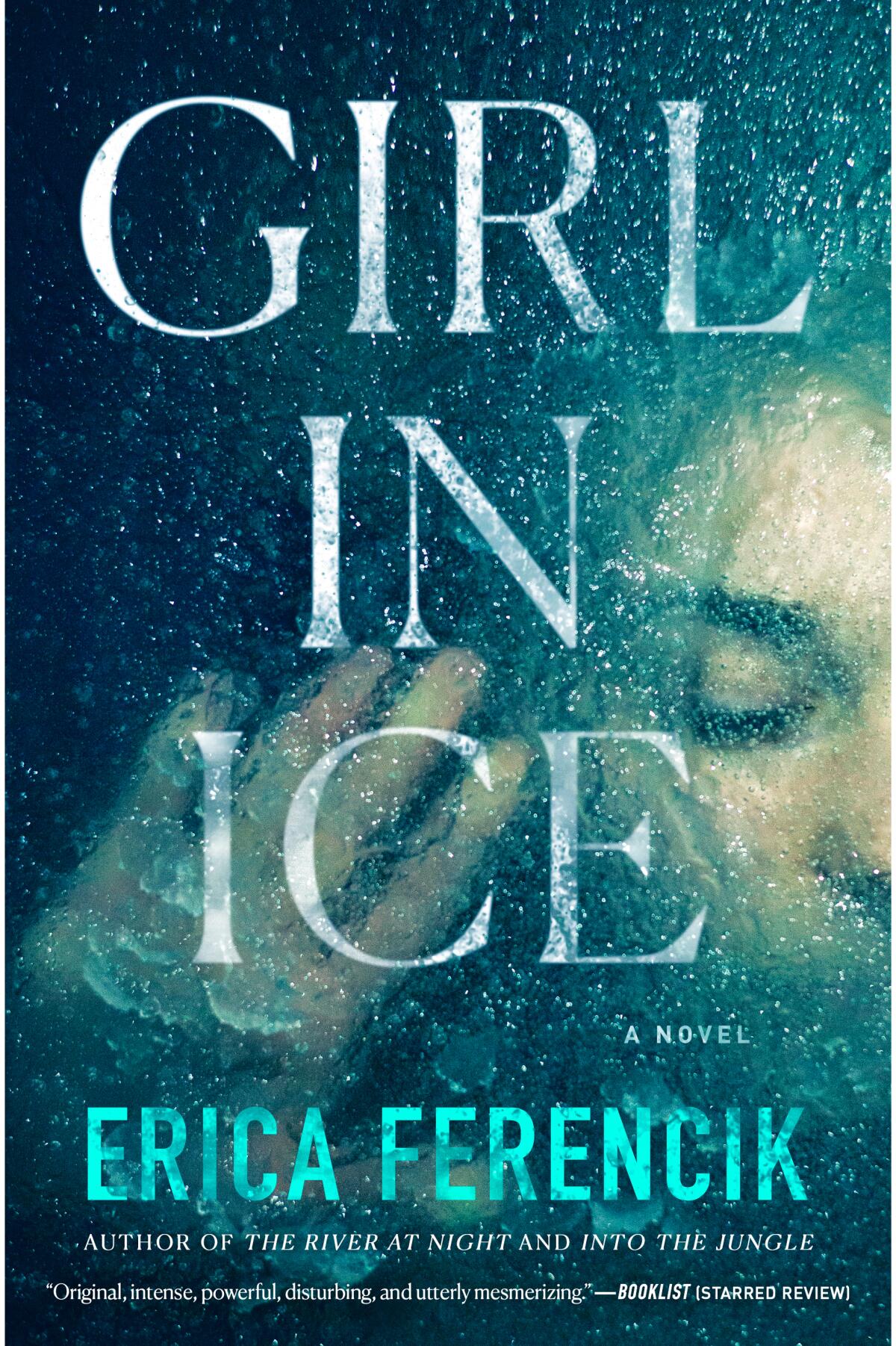
Val Chesterfield, the protagonist of Ferencik’s third thriller, is a Boston linguist whose love of languages belies a locked-in life crippled by anxiety and numerous phobias. She’s the polar opposite of her twin brother, Andy, an adventurous climatologist, whose concern about the increasing incidence of deadly ice storms spurs him to join his mentor, Wyatt Speeks, to conduct experiments at a remote Arctic outpost. There, he ventures out in subzero weather and freezes to death, leaving his twin bereft and their 91-year-old father convinced Speeks murdered his son. Five months later, Speeks emails Val a recording of the vocalizations of a girl found frozen in the ice; can she help decipher them? Paralyzed by her insecurities, Val hesitates to get involved, but her father, eager to prove himself right, issues an ultimatum: “Go, Val, or don’t bother coming to see me anymore.”
Jim Shepard has earned a cult following for refashioning history’s horrors. “Phase Six,” about a future pandemic, is his timeliest novel yet.
Before long, Val has confronted both her fear of flying and her claustrophobia — trapped in close quarters with the girl, Speeks, a taciturn mechanic and two polar marine scientists. A sinister cloud of suspicion surrounds the encampment, as unforgiving as an Arctic storm. Val calls it “‘the Enormity,’ an emotional and physical space so overwhelming, I couldn’t face it without drugs or alcohol.”
Nevertheless, Val forms a bond with the 9-year-old girl, known as Sigrid, and conducts a surreptitious and increasingly dangerous investigation into Andy’s death. Once you get over the implausibility of Sigrid’s revival, Val’s courage in the face of severe limitations feels both inspiring and true.
Known for immersing herself in challenging environments, Ferencik infuses every page with her research in the fjords of Greenland (where the Inuktun word for climate change translates to “a friend acting strangely”). That plus a writer’s eye for the telling detail have produced some of the most original thriller writing about Arctic environments since Peter Høeg’s 1993 novel “Smilla’s Sense of Snow.” As science-driven thriller and probing exploration of fear, language and family bonds, “Girl in Ice” will not be easily forgotten.
Don’t Know Tough
By Eli Cranor
Soho Press: 336 pages, $25
March 22
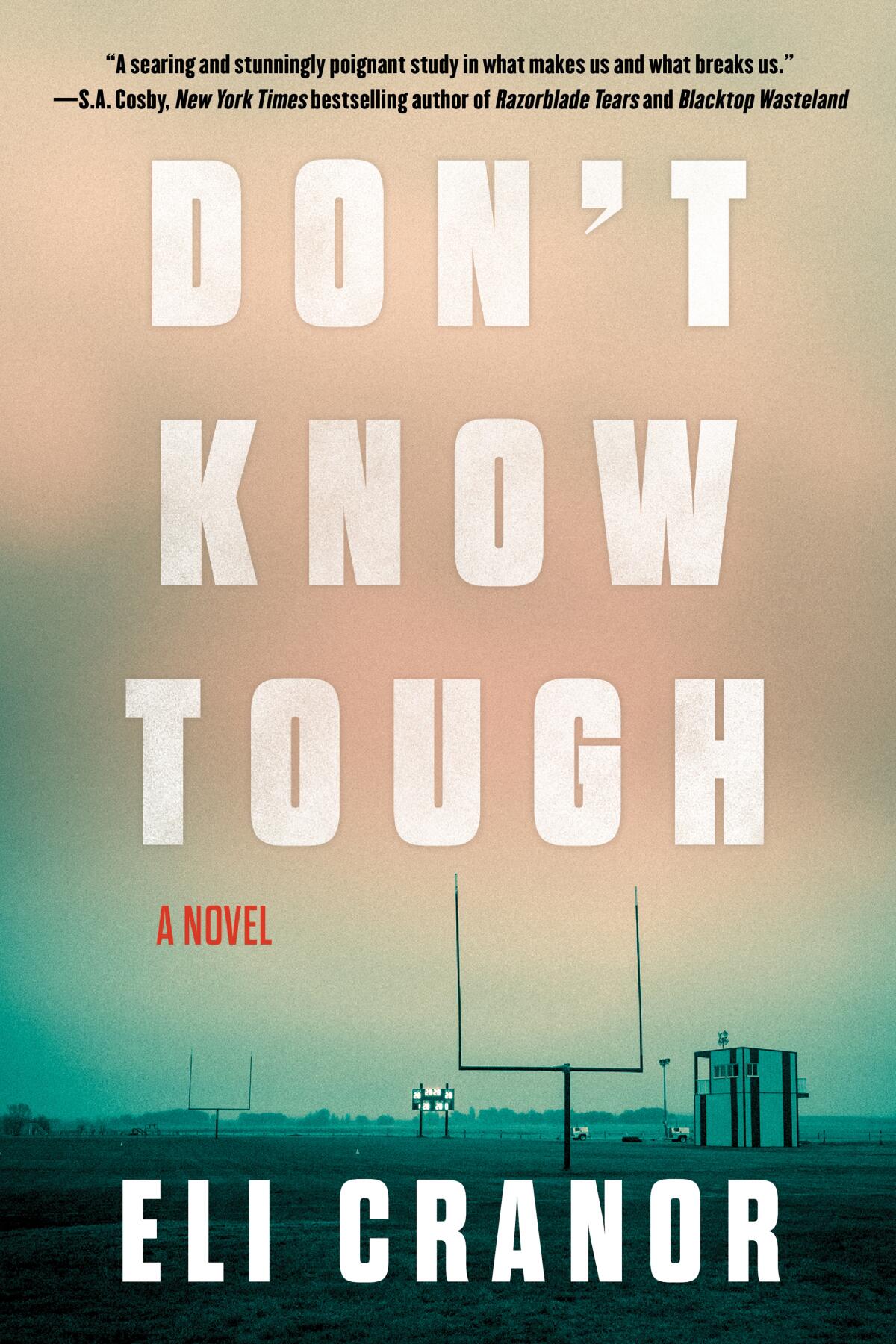
The stakes are high in Cranor’s debut, set in a football-mad Arkansas town at the foot of the Ozarks. The Denton High Pirates have two secret weapons that could propel them to the state championship — Billy Lowe, a volatile but gifted running back, and Trent Powers, a deeply religious football coach newly arrived from Southern California.
In alternating chapters, the story of Billy’s violent family unfurls, as does the pressure on Trent to succeed, egged on by his wife, Marley, a daddy’s girl to Trent’s mentor, a demanding athletic director back in California. Things come to a head when Billy, furious about the casual cruelty of his mother’s boyfriend, Travis (a.k.a. “Him”), lashes out during practice at a teammate, injuring him badly: “There’s a cracking sound — not thunder, not lightning, and damn sure not sheet metal — this is the sound of my heart breaking, the sound of violence pouring out.”
“Violent men unknown to me have occupied my mind all my adult life,” Michelle McNamara wrote in “I’ll Be Gone in the Dark: One Woman’s Obsessive Search for the Golden State Killer.”
Everyone, from the victim’s influential father to Denton High’s principal, wants to banish Billy. Coach Powers, however, shares something with the teen that transcends the sport and hints at a darker past.
Billy’s subsequent suspension sets off a chain of violence that culminates in a vicious assault on Travis. When Momma finds Travis dead, readers may think they know what happened, but Cranor has some twists in store — in a plot that calls to mind Megan Abbott’s depictions of claustrophobic competitive cultures. A former quarterback who coached for five years at an Arkansas high school, Cranor brings an insider’s understanding of the game, the region and human nature.
INSTALLMENTS WORTH A READ
Homicide and Halo-Halo
By Mia P. Manansala
Berkley: 304 pages, $16
Shady Palms’ nascent baker and entrepreneur Lila Macapagal must overcome PTSD, depression and associated family stigma to help cousin Bernadette, suspected of the murder of an obnoxious teen pageant judge. More sobering than the delectable “Arsenic and Adobo,” this solid second entry in a series features Lila’s ever-engaging family dynamics and enticing Filipino recipes.
Murder at the Porte de Versailles
By Cara Black
Soho Press: 360 pages, $28
March 15
In the aftermath of 9/11, in the last of Cara Black’s long-running series arranged around Paris’ arrondissements, Aimée Leduc must clear a friend from suspicion for being involved in what looks like a terrorist bombing while sorting out her increasingly complicated personal life. While fans may wonder what’s next for the redoubtable Leduc after Paris, it’s clear from the intricate plotting and tantalizing loose ends that Black has plenty of stories left to tell.
QUEER MYSTERY PIONEERS
Joseph Hansen reissued
Syndicate Books
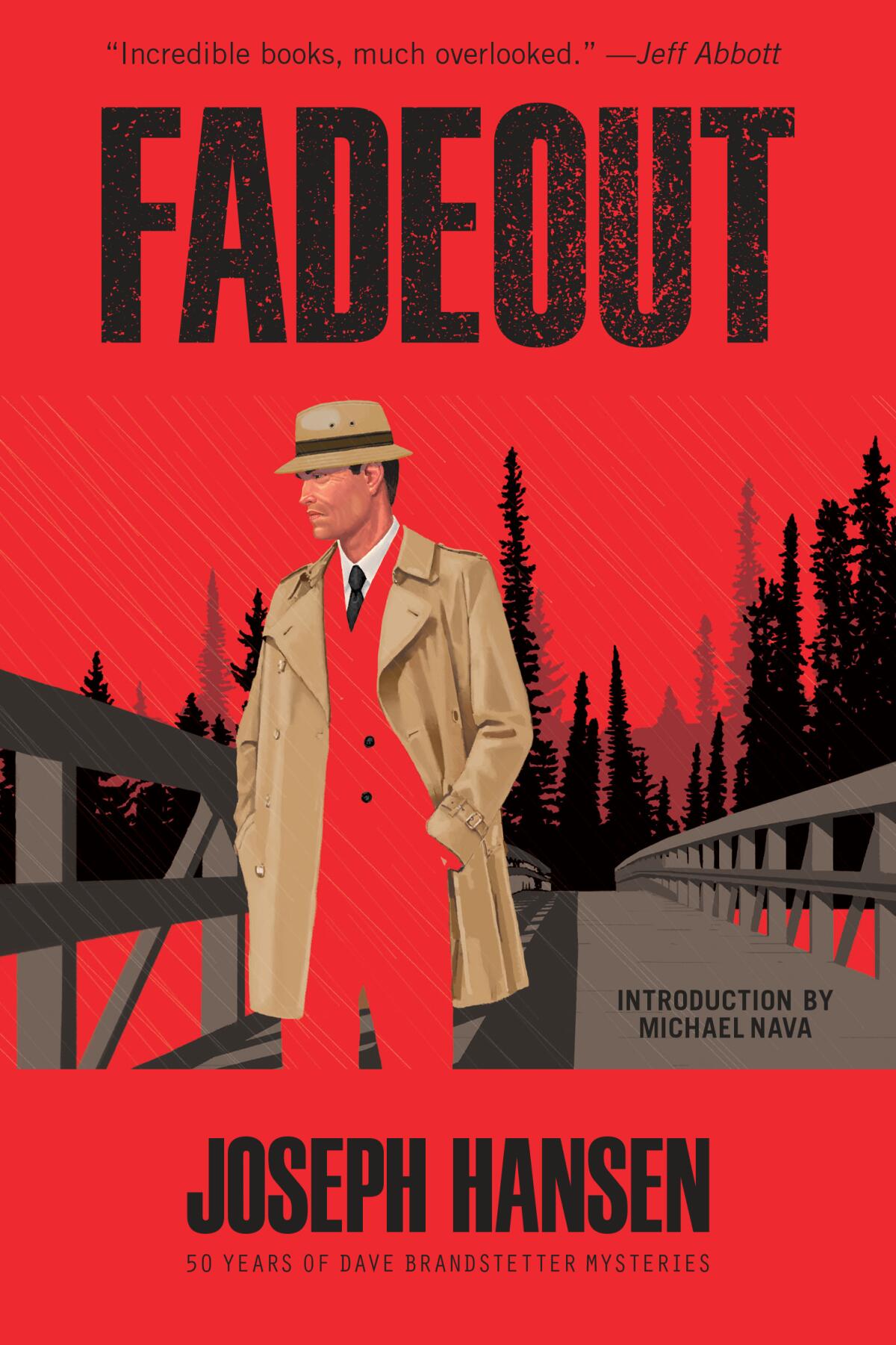
Today’s growing generation of LGBTQ crime writers stands on the shoulders of Joseph Hansen (1923-2004), the pioneering crime writer. This year, Syndicate Books is reprinting all 12 of his books, with five out so far. They will introduce a new generation of readers to the openly homosexual (Hansen’s preferred term) insurance adjuster David Brandstetter, as iconic and influential a sleuth as Philip Marlowe, Kinsey Millhone or Easy Rawlins. An introduction by Michael Nava, one of Hansen’s literary progeny, in “Fadeout,” the first in the series, provides useful context and analysis.
Survivor’s Guilt
By Robyn Gigl
Kensington: 352 pages, $27
Art imitated life in Gigl’s gripping 2021 debut, “By Way of Sorrow,” which introduced readers to Erin McCabe, a transgender New Jersey defense attorney. In “Survivor’s Guilt,” McCabe defends another trans client, Ann Parsons, who has confessed to murdering her adoptive father, a wealthy businessman. McCabe and partner Duane Swisher reveal a web of exploitation, lies and darker deeds, and a killer who will upend sympathies for the victim and villain alike. Another barrier-breaking thriller from a voice missing too long from the mystery chorus.
Five reviewers of crime fiction recap dominant trends in 2021, including a profusion of diverse narratives, genre crossovers and, of course, true crime.
Woods is a book critic, editor and author of the “Charlotte Justice” mystery series.
More to Read
Sign up for our Book Club newsletter
Get the latest news, events and more from the Los Angeles Times Book Club, and help us get L.A. reading and talking.
You may occasionally receive promotional content from the Los Angeles Times.
